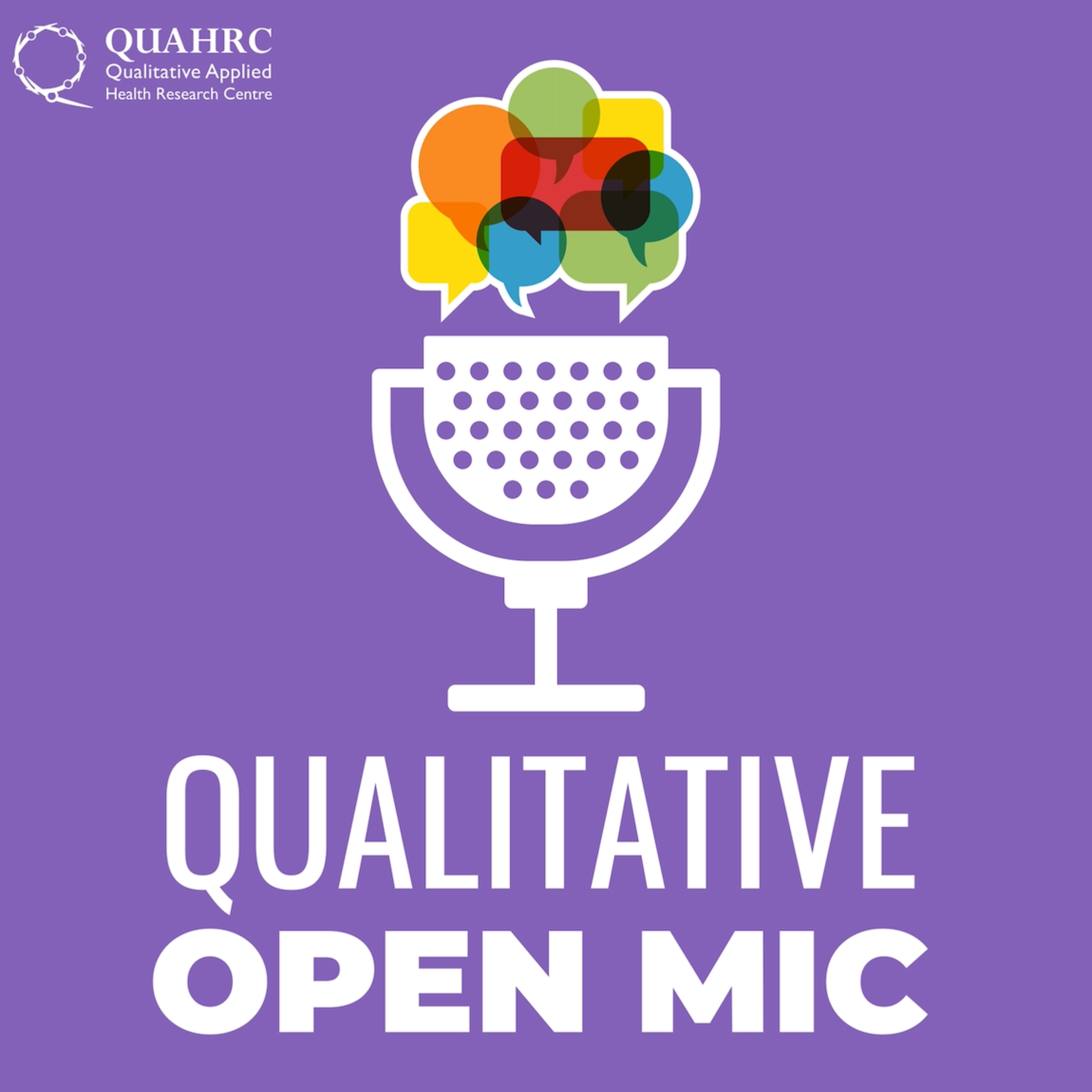

The Qualitative Open Mic
quahrc
The Qualitative Applied Health Research Centre dives into current applications, innovations, and conundrums for all those interested in qualitative research, academics and non-academics alike.
Episodes
Mentioned books

Dec 18, 2024 • 37min
Qualitative Controversies: Hyab Yohannes and Tesfalem Yemane on refugee-led scholarship
Why are there limited voices from sanctuary seekers in qualitative research about migrant health? Tesfalem Yemane and Hyab Yohannes bring a vital perspective on 'refugee-led scholarship', dissecting the challenges and significance of broadening the scholarly space to include those who have first-hand experience seeking sanctuary.

Nov 20, 2024 • 34min
Controversies in qualitative research: Amy Wells on challenging tokenistic involvement
Amy Wells, who works in communications for the National Survivor User Network, dives deep into the critical issue of tokenism in research involving service users. She highlights the thin line between genuine engagement and superficial involvement, stressing the importance of recognizing lived experiences as valuable insights. The discussion covers barriers to meaningful participation, advocating for innovative funding approaches like crowdfunding, and the necessity for ethical, long-term relationships with user-led groups to foster true collaboration.

Oct 23, 2024 • 56min
Qualitative Controversies: health research under siege
Amidst the ongoing occupation and genocide in Palestine, how do qualitative health researchers navigate their work and find their voice? What kind of research is it possible or ethical to do under siege? This episode, Sohail speaks to Weeam Hammoudeh, Zeina Amro, and Layth Hanbali. They delve into the courage, resilience, and ethical considerations that researchers from this region grapple with, touching upon the broader implications for academic freedom and advocacy.

Oct 16, 2024 • 2min
Coming soon: Health research under siege: being a qualitative researcher in Palestine
Watch this space for the next episode in our controversies series - we're translating the transcript for this one into Arabic so we've got a slight delay and will have it out next week. Join us then for "Health research under siege: being a qualitative researcher in Palestine".

5 snips
Sep 18, 2024 • 35min
Qualitative Controversies: Peter West-Oram on government influence in research
Peter West-Oram, an expert on government influence in research, discusses the implications of political sensitivities on academic integrity. He highlights a recent controversy sparked by government accusations against a UKRI committee regarding their views on Palestine. Alongside Sohail, they tackle the complexities of culture wars in research and the legal challenges faced by academics. The conversation delves into how government funding affects research independence and the precarious position of scholars amid rising political pressures.

Aug 21, 2024 • 33min
Qualitative Controversies: Ginger Johnson on emergency response
Ginger Johnson, an expert in qualitative research with a focus on emergency response planning, challenges the idea that qualitative data is slow and ineffective. She discusses the vital role qualitative insights play in understanding human behavior and community dynamics during crises. Ginger shares real-life examples of how qualitative research informed emergency responses, especially in refugee situations. She highlights the importance of local researchers and adapting research methods for immediate, sensitive interventions, proving that every narrative truly matters in emergencies.

Jul 18, 2024 • 29min
Qualitative Controversies:Tiarna Lee on the machine behind the method
Sohail speaks to Tiarna Lee to explore the frontier of AI's role in health research.explore the frontier of AI's role in health research. While technology offers innovative ways to approach analysis, it comes with its unique set of challenges. From ethical considerations to methodological accuracy, join us as we dissect the potential and pitfalls of integrating AI in research. We ask, “can you have qualitative health research without the heart and soul?”
Tiarna is a third year PhD student at the School of Biomedical Engineering & Imaging Sciences. Her research focuses on evaluating fairness and biases in AI used for cardiac imaging. In her work, she has found that models trained with imbalanced datasets have a worse performance on underrepresented subjects, often minority ethnicities and females. She is currently aiming to find the sources of these biases so that she can then find a method to address and mitigate them.

Jun 19, 2024 • 33min
Qualitative Controversies: Profit and pricing in academia with Kirsten Bell
In July 2023, all of the 44 editors of acclaimed Critical Public Health journal simultaneously resigned, citing concerns about Taylor and Francis' pricing system. They went on to found a new independent journal, the Journal of Critical Public Health. We speak to an editorial board member who resigned, Kirsten Bell. Kirsten sheds light on the intricate dynamics between profit, pricing, and the neoliberal influence on qualitative health research.

May 15, 2024 • 33min
Making interpretations: Joy Llewellyn-Beardsley on lived experience
This episode reflects on how lived experience can engender insights, support the interpretative process and enhance the trustworthiness of qualitative research. We consider the different kinds of experience that can enhance this process, the limits of individual lived experience, and what this means for researchers who don’t have personal experience of the phenomenon under study.

Apr 17, 2024 • 35min
Making interpretations: Elaine Keane on Constructivist Grounded Theory
Constructivist grounded theory's origins lie in criticisms of classical grounded theory as overly objectivist and insufficiently reflexive when it comes to interpretive processes. Sohail and Elaine discuss this context before going on to unpack the whys and hows of interpretation in constructivist grounded theory, how researchers can make the vital leap from description of data to higher-level conceptualisation, plus the pitfalls to avoid along the way.


